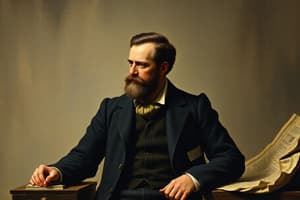Podcast
Questions and Answers
What is the main idea behind the principles outlined by Henri Fayol?
What is the main idea behind the principles outlined by Henri Fayol?
- Treating employees with kindness and respect
- Giving managers the freedom to apply principles efficiently (correct)
- Improving working conditions to increase productivity
- Structuring organizations in a hierarchical system
What is the primary focus of the Human Relations Management theory?
What is the primary focus of the Human Relations Management theory?
- Creating a hierarchical system of governance
- Dividing labor to increase efficiency
- Motivating employees through personal attention and group dynamics (correct)
- Improving working conditions to increase productivity
What is the key concept underlying the Systems Management theory?
What is the key concept underlying the Systems Management theory?
- Synergy and interdependence between subsystems (correct)
- Unity of direction and command
- Centralization of decision-making authority
- Division of labor and responsibility
Which management theory emphasizes the importance of a clear chain of command and strict rules and regulations?
Which management theory emphasizes the importance of a clear chain of command and strict rules and regulations?
What is the primary motivation of employees according to the Human Relations Management theory?
What is the primary motivation of employees according to the Human Relations Management theory?
According to Frederick Taylor's scientific management theory, what is a key recommendation to increase productivity?
According to Frederick Taylor's scientific management theory, what is a key recommendation to increase productivity?
What key aspect of management did Henri Fayol focus on in his Administrative Management theory?
What key aspect of management did Henri Fayol focus on in his Administrative Management theory?
Which early management theorist believed that money was a key motivator for employees?
Which early management theorist believed that money was a key motivator for employees?
In the context of Administrative Management, what did Henri Fayol believe were the main functions of leaders?
In the context of Administrative Management, what did Henri Fayol believe were the main functions of leaders?
What distinguished Frederick Taylor's scientific management theory from modern management practices?
What distinguished Frederick Taylor's scientific management theory from modern management practices?
Flashcards are hidden until you start studying
Study Notes
Theories of Management
Administrative Management
- Developed by Henri Fayol in the 19th century
- Focuses on the perspective of managers and the situations they might encounter
- Five main functions of leaders: forecast, plan, coordinate, command, and control
- Principles outline how leaders should organize and interact with their teams
Classical School
- Paved the way by preclassicists Robert Owen and Charles Babbage
- Believes in structured management approaches
- Notion that money motivates employees
Scientific Management
- Developed by Frederick Taylor in the late 1800s
- Takes a scientific approach to management
- Recommends simplifying tasks to increase productivity
- Leaders should assign team members to jobs that best match their abilities, train them thoroughly, and supervise them to ensure efficiency
- Focuses on achieving maximum workplace efficiency by finding the optimal way to complete a task
Fayol's Principles
- Freedom of initiating
- Equity (treating everyone equally with kindness)
- Centralization (topmost authority makes most important decisions)
- Order (right person at the right place)
- Division of responsibility
- Discipline (obedient workers, clearly defined rules and regulations)
- Unity of direction (one manager per department)
- Job security
- Team work (cooperation is better than individual performances)
- Scalar chain (line of authority)
- Unity of Command
- Subordination of individual interest to the organization's needs
- Employee compensation
- Division of work
Bureaucratic Management
- Developed by Max Weber
- Focuses on structuring organizations in a hierarchy with clear rules of governance
- Principles include a chain of command, clear division of labor, separation of personal and organizational assets, strict and consistent rules and regulations, meticulous record-keeping and documentation, and selection and promotion of employees based on performance and qualifications
Human Relations Management Theory
- Developed by Elton Mayo
- Focuses on changing working conditions to improve productivity
- Experiments showed that improvements were due to researchers paying attention to employees and making them feel valued, rather than changes to working conditions themselves
- Theory states that employees are more motivated by personal attention and being part of a group than by money or working conditions
Systems Management Theory
- Asserts that businesses consist of multiple components that must work in harmony for the larger system to function optimally
- Organization's success depends on synergy, interdependence, and interrelations between subsystems
- Employees are the most important components of a company, and departments, workgroups, and business units are all crucial elements for success
Studying That Suits You
Use AI to generate personalized quizzes and flashcards to suit your learning preferences.




